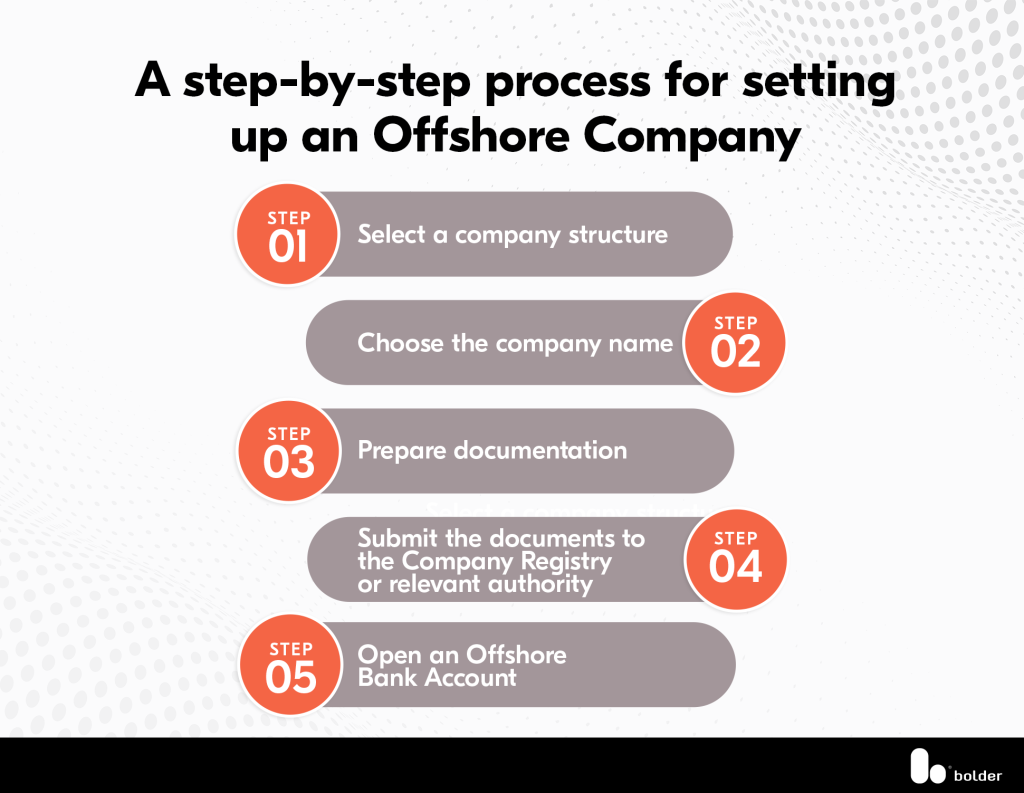How Offshore Company Formations Assist Business Owners Streamline International Operations
Wiki Article
Demystifying Offshore Company Formations: How They Operate and What to Expect
Offshore company formations can appear facility and enigmatic. Offshore Company Formations. These entities, usually developed for tax benefits and privacy, run under unique legal frameworks. Business owners might discover themselves navigating via a maze of policies and compliance requirements. Comprehending the ins and outs is crucial for success. What are the genuine advantages? What are the possible pitfalls? A closer exam exposes the subtleties that could affect decision-making substantiallyComprehending Offshore Business: Types and definitions
Offshore companies are entities developed in a jurisdiction outside of a person's or service's primary nation of house, usually for functions associated to tax optimization, property security, or regulatory benefits. These business can take different forms, consisting of limited responsibility business (LLCs), international company companies (IBCs), and offshore trust funds. Each kind offers details features and attract various requirements.Restricted obligation firms supply owners with security from individual obligation, while global organization firms are popular for their versatility and marginal reporting needs. Offshore trusts, on the various other hand, are utilized mostly for estate preparation and asset security.
The selection of jurisdiction substantially influences the business's procedures, as some locations use much more favorable legal structures and privacy defenses. Offshore Company Formations. Understanding the differences in between these types is crucial for organizations and individuals considering offshore structures, as each option carries various implications for governance and conformity
The Advantages of Developing an Offshore Firm
Establishing an overseas company can supply countless benefits, particularly for those seeking to improve their financial methods and shield their properties. One substantial advantage is tax optimization; several territories use positive tax obligation prices or exemptions, allowing companies to keep more profits. Furthermore, offshore companies can provide a layer of privacy, shielding the identities of owners and investors from public examination.One more benefit is asset defense. By putting properties in an offshore entity, people can safeguard their riches from potential legal claims or political instability in their home nations. This framework likewise helps with international company operations, enabling easier accessibility to international markets and diverse clients.
The facility of an offshore firm can improve integrity and reputation, appealing to clients who value global company methods. Generally, these advantages make overseas company formations an eye-catching choice for businesses and individuals going for financial development and protection.
Secret Considerations Prior To Developing an Offshore Entity
Prior to forming an overseas entity, several vital aspects have to be evaluated. Lawful conformity requirements, tax ramifications and benefits, as well as jurisdiction option, play a considerable role in the decision-making process. Recognizing these considerations can assist people and companies navigate the complexities of overseas business formations effectively.
Lawful Compliance Needs
When thinking about the development of an offshore entity, comprehending legal conformity demands is essential to assure adherence to both regional and international regulations. Potential service owners have to acquaint themselves with regulations controling business enrollment, reporting obligations, and functional requirements in the selected territory. This includes validating the legal needs for directors and investors, as well as making certain compliance with anti-money laundering (AML) and know-your-customer (KYC) regulations. Furthermore, businesses need to continue to be knowledgeable about any kind of licensing demands details to their industry. Engaging neighborhood legal and economists can provide useful insights, guaranteeing that all needed documentation is prepared and sent correctly. Eventually, detailed knowledge of lawful compliance aids reduce threats and promotes a lasting overseas procedure.Tax Obligation Implications and Benefits
Various entrepreneur consider the tax obligation ramifications and benefits of forming an overseas entity as a crucial element in their decision-making process. Offshore business can offer significant tax benefits, such as reduced corporate tax prices, exemption from certain neighborhood tax obligations, and the capacity to defer tax obligations on international revenue. These advantages can cause improved earnings and capital, making overseas frameworks appealing for worldwide service procedures. Additionally, the potential for tax treaties might better lessen tax obligation responsibilities. It is important for business proprietors to comprehend the complexities included, including conformity with both international and local tax obligation policies. Involving with tax specialists is recommended to browse these intricacies successfully and ensure ideal tax obligation planning approaches.Territory Selection Factors
What variables should one take into consideration when choosing a jurisdiction for overseas business formation? Secret factors to consider consist of tax performance, regulative setting, and political security. Territories with beneficial tax obligation regimens can considerably influence productivity. The regulatory landscape ought to supply flexibility and simplicity of compliance, enabling for effective service procedures. Political security is essential, as it ensures the safety and security of assets and continuity of procedures. In addition, the track record of the jurisdiction can impact customer count on and organization relationships. Availability to financial solutions and the accessibility of specialist support services are additionally important. Lastly, understanding local regulations concerning coverage, ownership, and personal privacy requirements is important to ascertain that the overseas entity aligns with business proprietor's goals and lawful responsibilities.The Refine of Establishing an Offshore Company
Setting up an offshore visit company entails a series of critical steps that call for cautious preparation and conformity with international guidelines. A specific must pick an appropriate territory that aligns with their service purposes and offers positive tax obligation benefits. Following jurisdiction selection, the following step is to choose a distinct business name and prepare the needed documentation, consisting of posts of consolidation and investor arrangements.When the paperwork is prepared, it needs to be submitted to the pertinent authorities along with the needed charges. After approval, the firm will certainly receive a certificate of unification, formally establishing its legal presence. The individual have to then open up a company savings account to help with financial purchases.
Keeping an overseas business includes adhering to recurring conformity requirements, such as annual coverage and tax obligation responsibilities, which differ by territory. Therefore, understanding each step is important for an effective overseas business development.
Regulatory and lawful Framework for Offshore Companies
While establishing an offshore firm can use significant benefits, it is important to steer via the complex legal and regulative structure that governs such entities. Each jurisdiction has its very own set of laws that determine whatever from firm formation to taxation and compliance needs. These guidelines are designed to stop illegal activities, such as money laundering and tax evasion, and frequently call for complete paperwork and openness.Crucial element of this framework consist of the need of selecting regional supervisors, keeping an authorized office, and sticking to annual coverage responsibilities. Additionally, several territories impose details licensing demands for sure organization activities. Recognizing these lawful terms is crucial for ensuring conformity and mitigating risks linked with charges or legal disputes. Engaging with lawful professionals that specialize in offshore firms can help in navigating with this complex landscape, inevitably promoting a certified and effective offshore business operation.
Usual Mistaken Beliefs Concerning Offshore Companies
Many individuals hold false impressions about offshore firms, usually equating them with tax obligation evasion and unlawful tasks. It is essential to acknowledge that these entities can run legitimately within a structure designed for reputable organization methods. Clarifying the legal standing of overseas business can help resolve these myths and promote a more exact understanding of their objective.Tax Obligation Evasion Misconceptions
Regardless of the expanding popularity of offshore companies, misunderstandings concerning their use for tax obligation evasion continue. Several people wrongly think that developing an overseas entity you could try these out is exclusively a way to prevent taxes. Nonetheless, overseas business are frequently utilized for legitimate objectives, such as property defense, worldwide service expansion, and financial investment diversification. The perception that all offshore tasks correspond to illegal tax obligation evasion neglects the intricacies of global tax guidelines and compliance requirements. Furthermore, the vast majority of overseas territories have implemented actions to fight tax obligation evasion, promoting openness and information exchange. This mischaracterization can hinder legitimate businesses and financiers from discovering the prospective advantages of offshore business formations while perpetuating a negative preconception bordering these entities.Legal Condition Clarified
The lawful standing of overseas companies is commonly misinterpreted, causing a selection of misunderstandings. Numerous think these entities operate in a legal grey area, thinking they are inherently unlawful or dishonest. In reality, offshore companies are legitimate organizations formed under the legislations of certain territories, designed for different reasons, consisting of asset defense and market expansion. Another typical false impression is that offshore companies evade tax obligations entirely; however, they are subject to the guidelines and tax obligation commitments of their home nations. In addition, some people believe that overseas business can be quickly made use of for cash laundering or illegal activities. While misuse can happen, a lot of jurisdictions implement rigorous compliance and transparency regulations to reduce such threats, ensuring that offshore companies operate within legal structures.
Managing and Operating Your Offshore Firm Successfully
Effectively handling and running an offshore firm needs a critical method that stabilizes compliance with local guidelines and the search of business goals. Successful overseas management includes understanding the territory's tax regulations, reporting requirements, and operational policies. Utilizing neighborhood specialists, such as accounting professionals and lawful experts, can offer vital understandings right into passing through these intricacies.In addition, developing clear interaction networks and functional protocols is important for maintaining effectiveness. Using innovation for job administration and cooperation can boost productivity, while regular performance reviews guarantee alignment with critical purposes.
Preserving robust financial documents is crucial, as openness promotes depend on with stakeholders and complies with worldwide requirements. Being adaptable to modifications in legislation or market conditions allows overseas business to pivot effectively, assuring long-lasting sustainability and growth. By sticking to these principles, organization owners can take full advantage of the advantages of their overseas endeavors while mitigating risks.
Regularly Asked Inquiries
Just how much Does It Expense to Maintain an Offshore Firm Yearly?
The price to preserve an offshore business every year varies considerably, usually varying from $1,000 to $5,000, depending on territory, services needed, and conformity obligations. It is essential to consider additional charges for specific demands.Can I Open Up a Savings Account for My Offshore Business From Another Location?
Opening up a bank account for an offshore business remotely is typically feasible. Nonetheless, requirements may vary by jurisdiction, often requiring documents and verification processes, which can complicate the remote application experience for people.Exist Specific Countries Known for Easier Offshore Business Formations?
Particular nations, such as Belize, Seychelles, and the British Virgin Islands, are renowned for their structured processes and beneficial policies regarding overseas firm developments, drawing in entrepreneurs looking for performance and privacy in service operations.
What Kinds of Organizations Are Ideal Fit for Offshore Companies?
Particular services, such as investment, consultancy, and ecommerce companies, frequently profit from overseas companies as a result of tax advantages, personal privacy, and governing adaptability - Offshore Company Formations. These entities commonly grow in territories that advertise desirable service environmentsHow Can I Guarantee Conformity With Regional Regulations When Operating Offshore?
To assure compliance with neighborhood laws when running offshore, it is necessary to engage lawful experts, carry out detailed research on territory regulations, and preserve clear financial documents, therefore reducing dangers connected with non-compliance.
Report this wiki page